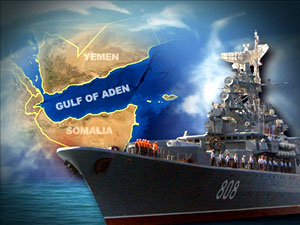FCNNEWSSOURCE
(FinalCall.com) – The standoff between Somalis labeled “pirates” by the U.S. media and the U.S. Navy ended with the fatal shootings of the men who held the captain of the Maersk Alabama hostage for five days.

The captain has been hailed as a hero and the American ego likely feels a bit boosted compared to the last encounter between U.S. soldiers and Somalis in 1993–which ended with Blackhawk helicopters shot down and American bodies dragged through the streets. Other U.S. servicemen barely survived firefights and at least 1,000 Somalis were killed in the battle for Mogadishu. The U.S. losses were so graphic and the psychological damage so intense that the incident made America less likely to play the role of world cop on the beat–at least when it has to put actual cops on the beat.
But like all conflicts, rarely are the good guys in one corner and the bad guys in another–in particular when it comes to American engagement with foreign nations.
Missing from the current news coverage and debate has been the Somali view of what has been dubbed piracy and kidnapping as the cornerstones of what has been called a multi-million dollar criminal enterprise.
Kidnapping and holding innocent ships and sailors for ransom is wrong, but what if ships were destroying a country’s coastline and possibly endangering the health of its people?
Somalia has been without a strong central government for some 20 years since the ouster of onetime U.S. patron and ruling strongman Mohammed Siad Barre. Different factions have fought and ruled sections of the country and brought varying degrees of order, and an Islamic group was making headway when the U.S. government dubbed the group an Al-Qaeda affiliate and moved to destroy its progress.
So over the years different Somali military leaders have found various ways to continue their fights and pay their militias. According to K’naan, a Somali-Canadian singer and activist whose perspective was featured on the Huffington Post website, today’s “piracy” originated with fishermen trying to stop the ruin of Somalia’s shoreline from toxic waste dumping by European nations. In addition to the dumping, the fishermen found their way of life destroyed by illegal European fishing in the waters of a country with no Coast Guard.
“It’s true that the constant hijacking of vessels in the Gulf of Aden is a major threat to the vibrant trade route between Asia and Europe. It is also true that for most of the pirates operating in this vast shoreline, money is the primary objective,” K’naan admitted.
But, he notes, piracy surfaced as a problem in 1992 with Ali Mahdi, one of two generals who defeated the dictator Barre. “A Swiss firm called Achair Parterns, and an Italian waste company called Achair Parterns, made a deal with Ali Mahdi, that they were to dump containers of waste material in Somali waters. These European companies were said to be paying Warlords about $3 a ton, whereas to properly dispose of waste in Europe costs about $1000 a ton,” wrote K’naan.
In 2004, several leaking containers washed ashore and “thousands of locals in the Puntland region of Somalia started to complain of severe and previously unreported ailments, such as abdominal bleeding, skin melting off and a lot of immediate cancer-like symptoms,” the writer continued. According to an official with the United Nations Environmental Program, the containers had deadly “radioactive waste, lead, Cadmium, Mercury and chemical waste.” As The Final Call reported several issues ago, Somalia’s diplomatic envoy at the United Nations has charged that the practice has not stopped.
The battles between Somalis in small boats and shipping vessels started as local fishermen and “street militias” moved to “deter the Westerners from having a free pass at completely destroying Somalia’s aquatic life. Now years later, the deterring has become less noble, and the ex-fishermen with their militias have begun to develop a taste for ransom at sea. … But while Europeans are well in their right to protect their trade interest in the region, our pirates were the only deterrent we had from an externally imposed environmental disaster. No one can say for sure that some of the ships they are now holding for ransom were not involved in illegal activity in our waters. The truth is, if you ask any Somali, if getting rid of the pirates only means the continuous rape of our coast by unmonitored Western Vessels, and the producing of a new cancerous generation, we would all fly our pirate flags high,” K’naan declared.
“It is time that the world gave the Somali people some assurance that these Western illegal activities will end, if our pirates are to cease their operations. We do not want the EU and NATO serving as a shield for these nuclear waste-dumping hoodlums. It seems to me that this new modern crisis is truly a question of justice, but also a question of whose justice. As is apparent these days, one man’s pirate is another man’s coast guard.”
The largely unheard of story about toxic waste dumping and illegal fishing may also explain the willingness of shipping companies to do business with the so-called pirates. It may have been a moral and business trade-off where both sides were able to get something and corporations have rarely let morality impact policy in Africa.
If plundering ships is wrong, plundering the natural resources of a poor nation and leaving death behind is even worse. What is needed is strong international action that demands Western nations respect the territorial boundaries of Somalia and its waters and corporations and shipping companies must be held accountable for their wrongdoing. The United States also shouldn’t revel too much in its “victory” at sea and should resist efforts to escalate the confrontations with Somalia given some calls to strike the pirates on land.












